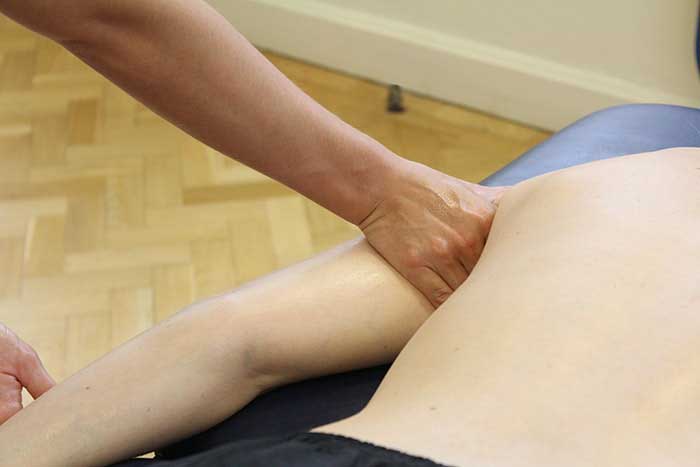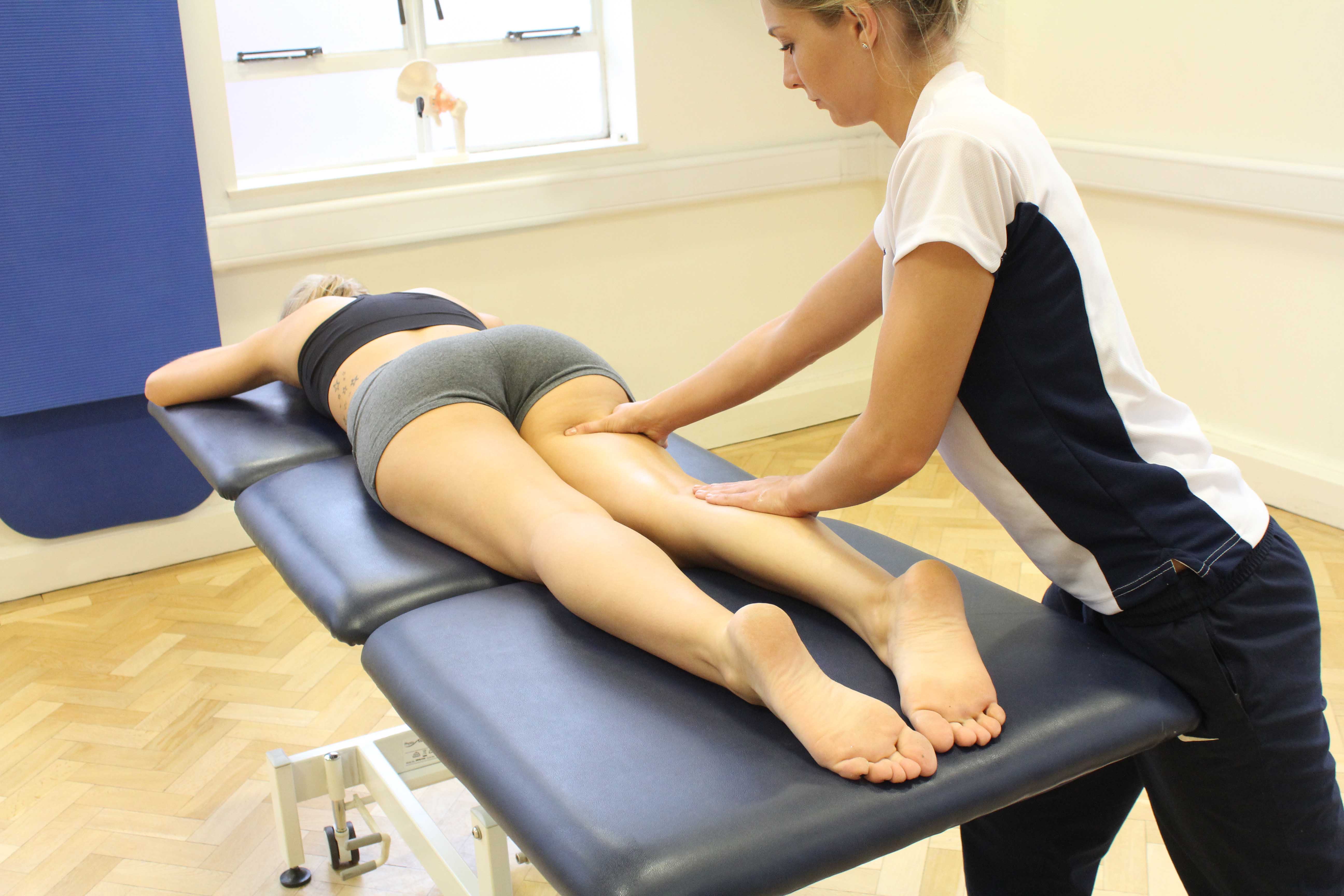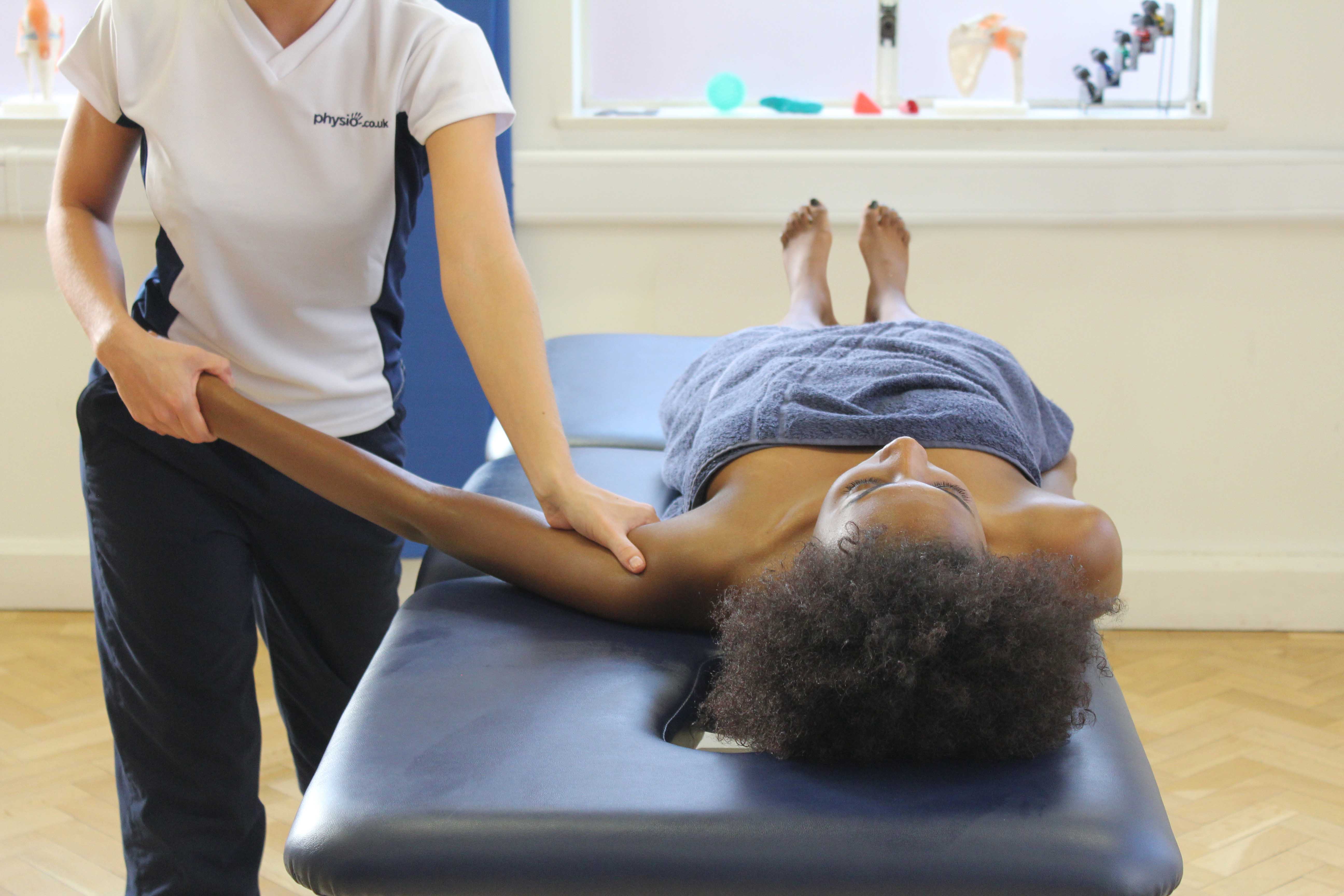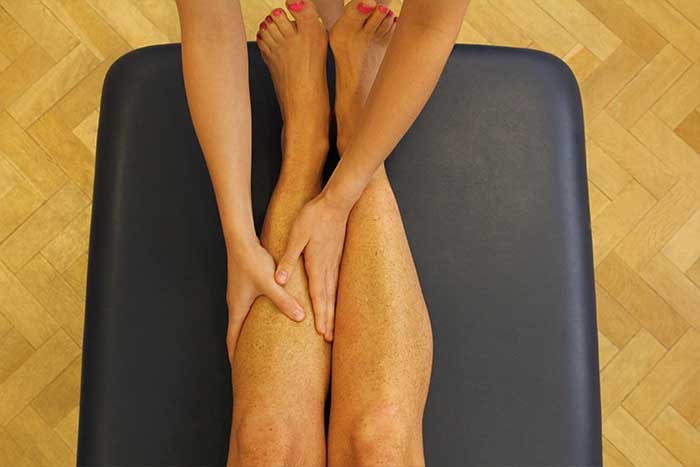Lymphatic drainage is light massage therapy treatment. Lymphatic drainage massage helps increase the function of the lymphatic system. The lymphatic system transports lymph fluid in the body that helps remove metabolic waste and toxins out of the body. The lymphatic system is made up of lymphatic vessels and lymph nodes that assist in the draining of unwanted fluids. The lymph flow does not have a pump and only flows in one direction towards the neck. Lymphatic drainage can also be used to reduce swelling or oedema after injury or surgery. Our massage therapists working at Physio.co.uk use lymphatic drainage massage to assist the removal of excess fluids and metabolic waste.
What is lymphatic drainage?
Lymphatic drainage is a massage type which encourages the natural removal of waste products from out of the body. Lymphatic drainage is the main function of the lymphatic system. The lymphatic system is part of the circulatory system that is made up of lymphatic vessels that carry a clear fluid called lymph towards the heart. The lymph system delivers both nutrients to cells and carries away excess water, cellular waste products, viruses and toxins. Lymphatic drainage is performed as a light massage type that encourages lymph flow around the body. Stimulating the lymphatic system is beneficial for detoxification, oedema and pre and post surgery.

When is lymphatic drainage used?
Lymphatic drainage can be used to help on many circumstances. These circumstances include:
 Above: Lymphatic drainage to the inguinal and femoral nodes massage technique
Above: Lymphatic drainage to the inguinal and femoral nodes massage techniqueLymphatic drainage can be very beneficial after surgery. Lymphatic drainage can begin as soon as 24 hours after surgery. Lymphatic drainage is used to alleviate oedema or swelling. Oedema and swelling are common symptoms after surgery and can cause pain and lead to infections. By applying lymphatic drainage to affected areas, swelling and pain can be reduced. Surgery can also affect the natural function of the lymphatic pathways which can lead to more health problems. Surgery can lead to lymph nodes and lymph vessels being removed or damaged. Lymphedema occurs when lymph nodes are affected due to surgery or illness. Lymphedema is an area of swelling caused by a build-up of lymph fluid. Without lymphatic nodes, the lymphatic system cannot function efficiently; therefore it can become reliant on manual lymphatic drainage in order to initiate lymphatic drainage.
Lymphatic drainage is used after injury. Lymphatic drainage helps by flushing out swelling after injury occurs. Swelling is the natural response to an injury. Swelling is the result of increased movement of fluid and white blood cells into the area of inflammation. When swelling occurs it can block the flow of lymph. Massage can perform directional strokes to an area to help reduce the swelling and stimulate the removal of excess fluids.
Lymphatic drainage is also used to enhance the immune system. Lymphatic drainage can be used to boost the lymph flow around the body refreshing the immune system. The immune system is important to defend the body from infections.
Lymphatic drainage can also be used to assist the body from infection. Toxins and waste products can be produced around the body after exercise, poor lifestyle and diet. When lymphatic drainage is applied, the direction of strokes on the body stimulates the lymphatic system. The fluid that is carried in the lymphatic system contains a high number of white blood cells which defends the body against infection and improves the immune system.
What are the physiological effects of lymphatic drainage?
Massage can produce many important physiological effects on the body. The physiological effects of lymphatic drainage include:
 Above: Lymphatic drainage to the axilla massage technique
Above: Lymphatic drainage to the axilla massage techniqueLymphatic drainage stimulates the movement of the lymphatic system. Lymphatic drainage increases the movement of the lymph flow by applying light pressure on the skin. The massage technique is performed in an upwards direction to help increase the drainage of excess fluid into the lymphatic nodes.
Lymphatic drainage aids the body's natural waste removal or detoxification. If waste products are not removed, they will increase in concentration and begin to damage cells. Lymphatic drainage assists the lymphatic system by increasing the flow of lymph towards the lymphatic nodes where toxins can be removed.
Lymphatic drainage also increases cellular exchange. Cellular exchange allows an increase of oxygen and nutrients to be filtered into the tissues. As oxygen and nutrients increase, metabolic wastes are removed so that muscles reduce in tension and tightness. Increasing cellular exchange so that oxygen and nutrients are increased is vital to maintaining healthy tissues around the body.

What are the benefits of lymphatic drainage?
Lymphatic drainage has many benefits. The benefits of lymphatic drainage include:
One benefit of lymphatic drainage is the improved recovery. Lymphatic drainage can help improve recovery from surgery and injury. Lymphatic drainage benefits the recovery stage by reducing swelling or oedema, removing waste products out of the body, improving the immune system and detoxicating tissues. Lymphatic drainage can help quicken recovery time and speed up the healing process.
Lymphatic drainage also helps reduce swelling. Lymphatic drainage is beneficial to use around areas of swelling or excess fluid (oedema). Swelling or oedema can be caused due to injury, overuse or lymphedema. A build-up of excess fluid caused by a problem in the lymphatic system is called lymphedema. If the lymphatic system does not function correctly, fluid cannot be transported and drained out the body. Specific massage techniques of lymphatic drainage help clear the lymph pathways to drain swelling or excess fluid away.
Another benefit of lymphatic drainage is that it can provide a therapeutic effect. Lymphatic drainage is performed very lightly onto the skin and uses long gentle strokes. Alongside many health benefits, lymphatic drainage stimulates an increase of temperature and feel good hormones. Feel good hormones produce feelings of calmness and content.
Common body parts treated by lymphatic drainage
There are many common body parts that can be treated with lymphatic drainage. Common body parts treated by lymphatic drainage are:
Lymphatic drainage can also be performed on other areas of the body and be effective to reduce lymphedema and improve the body's lymphatic system.
Summary
Lymphatic drainage is a specific massage type performed on the skin to assist the function of the lymphatic system. The lymphatic system is part of the circulatory system. The lymphatic system carries lymph fluid delivering nutrients to tissues and flushing away waste products. Lymphatic drainage can be used post-surgery, post injury, to improve the immune system and defend the body from infection. There are many benefits of lymphatic drainage including improved recovery, reduced swelling and relaxation. Massage therapists working at Physio.co.uk use lymphatic drainage as an effective massage technique to treat a range of conditions.
How can I arrange an appointment for a lymphatic drainage treatment?
The easiest way to arrange a lymphatic drainage treatment at Physio.co.uk is to email us at, office@physio.co.uk or call us on 0800 033 7800.
Alternatively if you have any questions please feel free to contact us.
We offer a 7 day service and provide home and clinic appointments.

 0330 088 7800
0330 088 7800


































